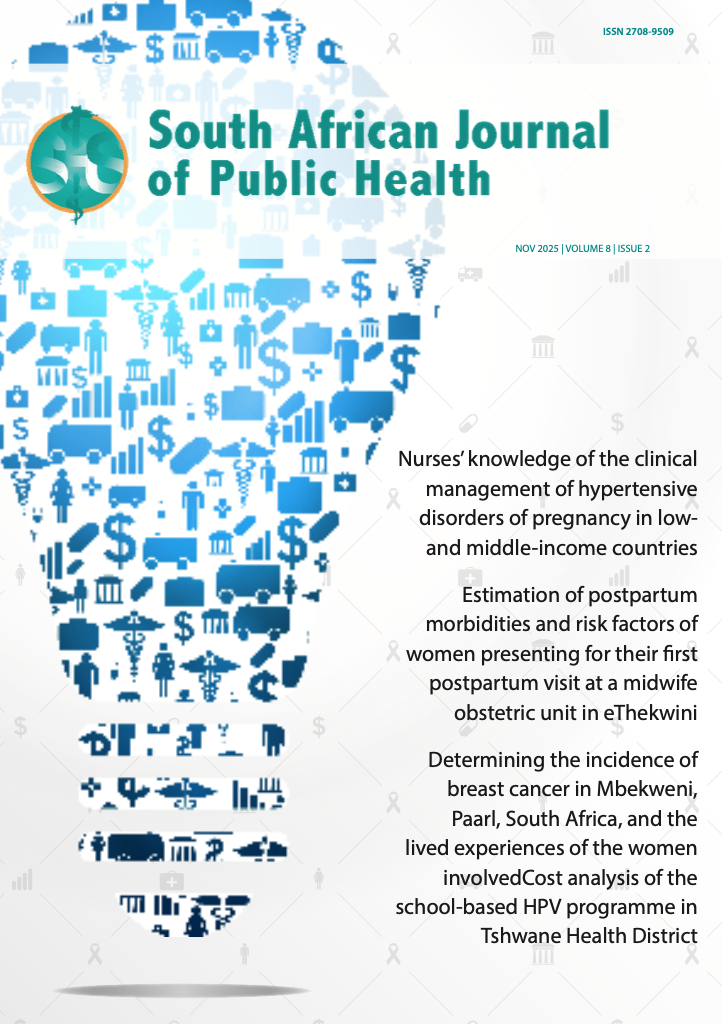Factors influencing stroke outcomes and the experiences of healthcare workers managing stroke patients in a South African hospital: A protocol for a mixed‐methods study
Main Article Content
Abstract
Background. Stroke, also known as cerebrovascular accident, is the second leading cause of death and a significant contributor to disability on a global scale. Stroke presents an important healthcare challenge in South Africa (SA), standing as the second most common cause of death after HIV/AIDS. However, there is a lack of comprehensive epidemiological data and research on the experiences of healthcare professionals in managing stroke patients in low- and middle-income countries such as SA.
Objectives. To describe the profiles of and factors affecting outcomes for stroke patients admitted to Steve Biko Academic Hospital, Pretoria, SA, and explore the experiences of healthcare professionals managing these patients.
Methods. The study will employ a mixed-methods approach, combining quantitative and qualitative methods. It will describe factors influencing outcomes for stroke patients at the hospital, utilising quantitative data analysis. Additionally, it will capture healthcare workers’ experiences through qualitative insights into their challenges and successes. Data will be gathered via REDCap forms for quantitative measures and through semi-structured interviews for qualitative information. Analysis will include descriptive statistics, logistic regression for variable relationships, and thematic analysis for qualitative patterns.
Conclusions. This research aims to improve understanding of stroke management and the impact of a stroke unit at a central hospital.
Article Details
Issue
Section

This work is licensed under a Creative Commons Attribution-NonCommercial 4.0 International License.
The SAJPH is published under an Attribution-Non Commercial International Creative Commons Attribution (CC-BY-NC 4.0) License. Under this license, authors agree to make articles available to users, without permission or fees, for any lawful, non-commercial purpose. Users may read, copy, or re-use published content as long as the author and original place of publication are properly cited.
How to Cite
References
1. Katan M, Luft A. Global burden of stroke. Semin Neurol 2018;38(02):208-211. https:// doi.org/10.1055/s-0038-1649503
2. GBD 2015 Neurological Disorders Collaborator Group. Global, regional, and national burden of neurological disorders during 1990-2015: A systematic analysis for the Global Burden of Disease Study 2015. Lancet Neurol 2017;16(11):877-897. https:// doi.org/10.1016/s1474-4422(17)30299-5
3. Feigin VL, Norrving B, George MG, Foltz JL, Roth GA, Mensah GA. Prevention of stroke: A strategic global imperative. Nat Rev Neurol 2016;12(9):501-512. https:// doi.org/10.1038/nrneurol.2016.107
4. Van Niekerk SM, Kamalakannan S, Inglis-Jassiem G, et al. Towards universal health coverage for people with stroke in South Africa: A scoping review. BMJ Open 2021;11(11):e049988. https://doi.org/10.1136/bmjopen-2021-049988
5. Scheffler E, Mash R. Surviving a stroke in South Africa: Outcomes of home-based care in a low-resource rural setting. Top Stroke Rehabil 2019;26(6):423-434. https:// doi.org/10.1080/10749357.2019.1623473
6. Pillay-van Wyk V, Msemburi W, Laubscher R, et al. Mortality trends and differentials in South Africa from 1997 to 2012: Second National Burden of Disease Study. Lancet Glob Health 2016;4(9):e642-e653. https://doi.org/10.1016/S2214-109X(16)30113-9
7. Maredza M, Bertram MY, Gómez-Olivé XF, Tollman SM. Burden of stroke attributable to selected lifestyle risk factors in rural South Africa. BMC Public Health 2016;16(1):143. https://doi.org/10.1186/s12889-016-2805-7
8. Coovadia H, Jewkes R, Barron P, Sanders D, McIntyre D. The health and health system of South Africa: Historical roots of current public health challenges. Lancet 2009;374(9692):817-834. https://doi.org/10.1016/s0140-6736(09)60951-x
9. Bryer A, Connor M, Haug P, et al. South African guideline for management of ischaemic stroke and transient ischaemic attack 2010: A guideline from the South African Stroke Society (SASS) and the SASS Writing Committee. S Afr Med J 2010;100(11 Pt 2):747-778. https://doi.org/10.7196/SAMJ.4422
10. Ntaios G, Faouzi M, Ferrari J, Lang W, Vemmos K, Michel P. An integer-based score to predict functional outcome in acute ischemic stroke. Neurology 2012;78(24):1916- 1922. https://doi.org/10.1212/WNL.0b013e318259e221
11. United Nations General Assembly. United Nations high-level meeting on non- communicable diseases. 2018. https://docs.un.org/en/A/73/L.2 (accessed 25 June 2024).
12. United Nations. Transforming our world: The 2030 Agenda for Sustainable Development. 2015. https://sdgs.un.org/2030agenda (accessed 25 June 2024).
13. World Health Organization. WHO Discussion Paper on the development of an
implementation roadmap 2023-2030 for the WHO Global Action Plan for the Prevention and Control of NCDs 2013-2030. 2021. https://www.who.int/publications/m/item/ implementation-roadmap-2023-2030-for-the-who-global-action-plan-for-the- prevention-and-control-of-ncds-2023-2030 (accessed 26 June 2024).
14. Smythe T, Inglis-Jassiem G, Conradie T, et al. Access to health care for people with stroke in South Africa: A qualitative study of community perspectives. BMC Health Serv Res 2022;22(1):464. https://doi.org/10.1186/s12913-022-07903-9
15. Braun V, Clarke V, Hayfield N, Terry G, Liamputtong P. Thematic analysis. In: Liamputtong P, ed. Handbook of Research Methods in Health Social Sciences. Singapore: Springer, 2019:843-860.
